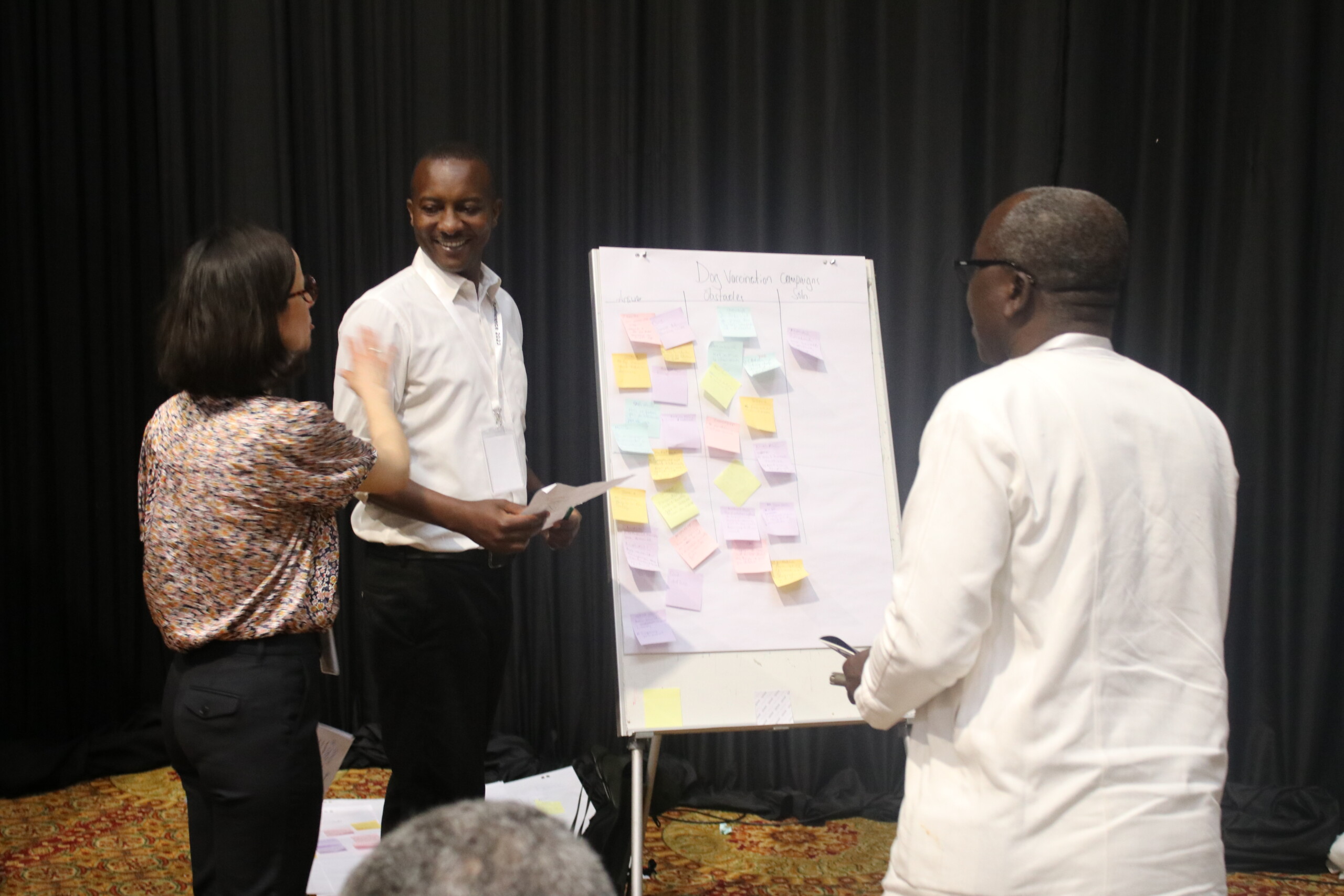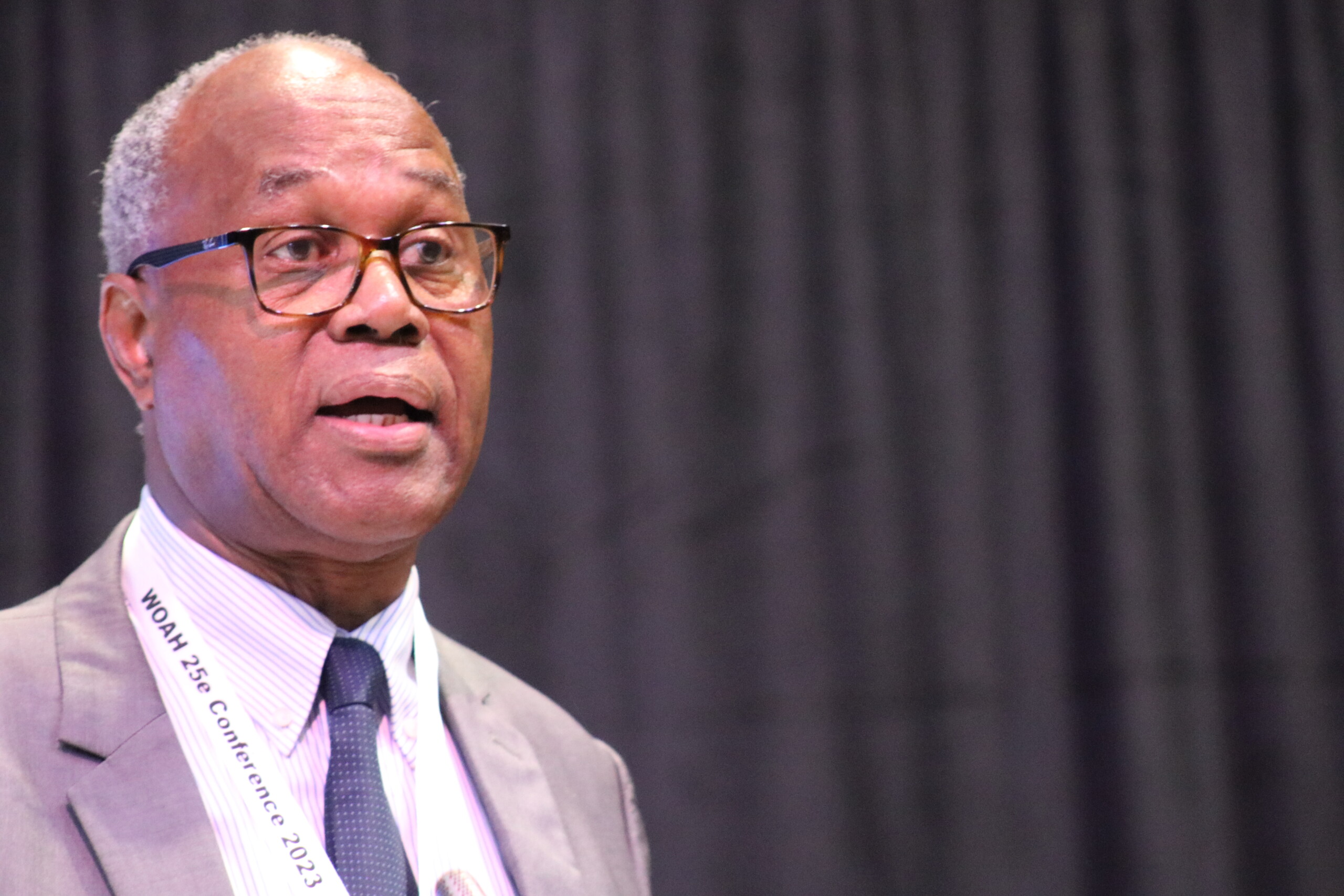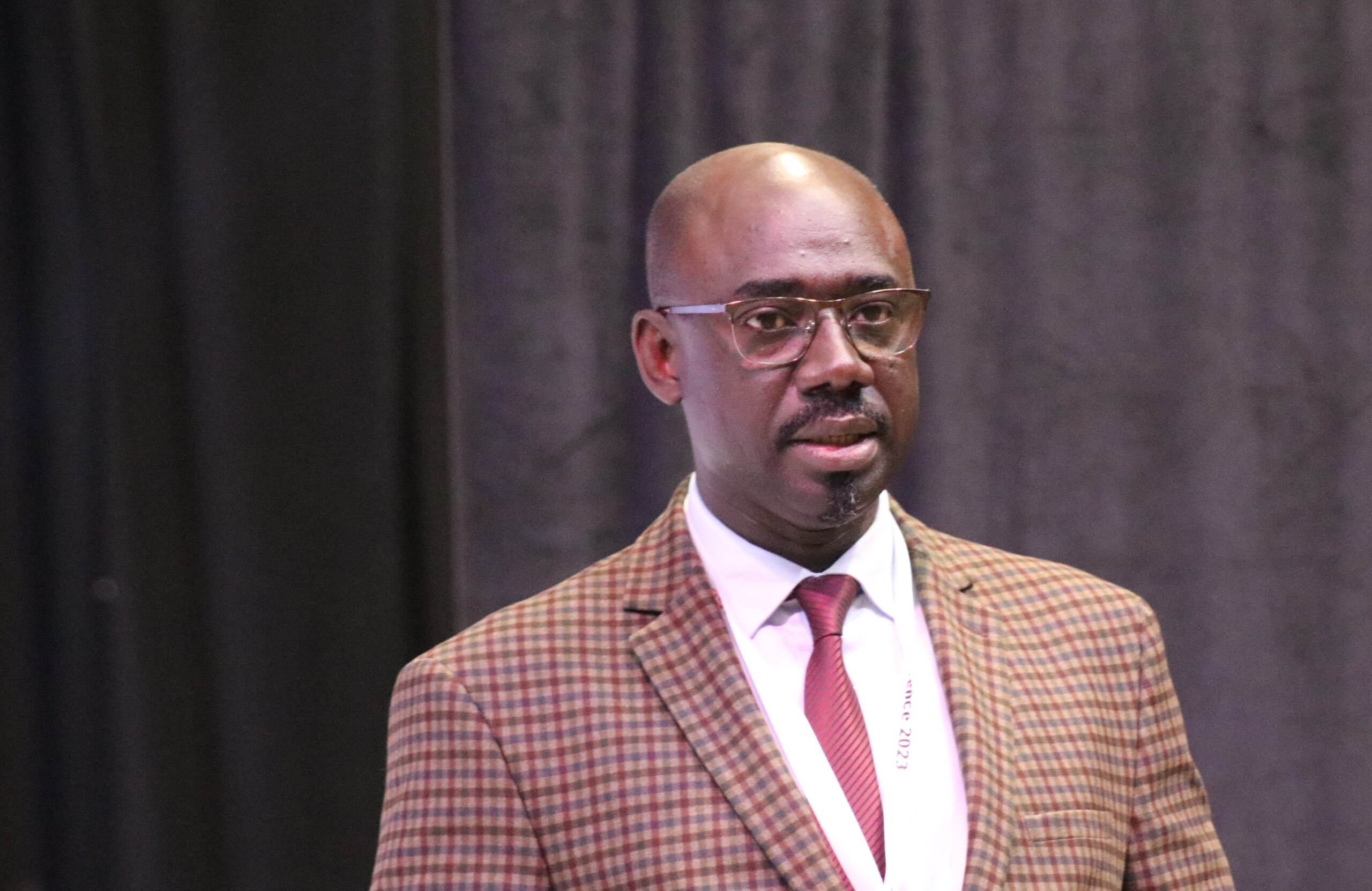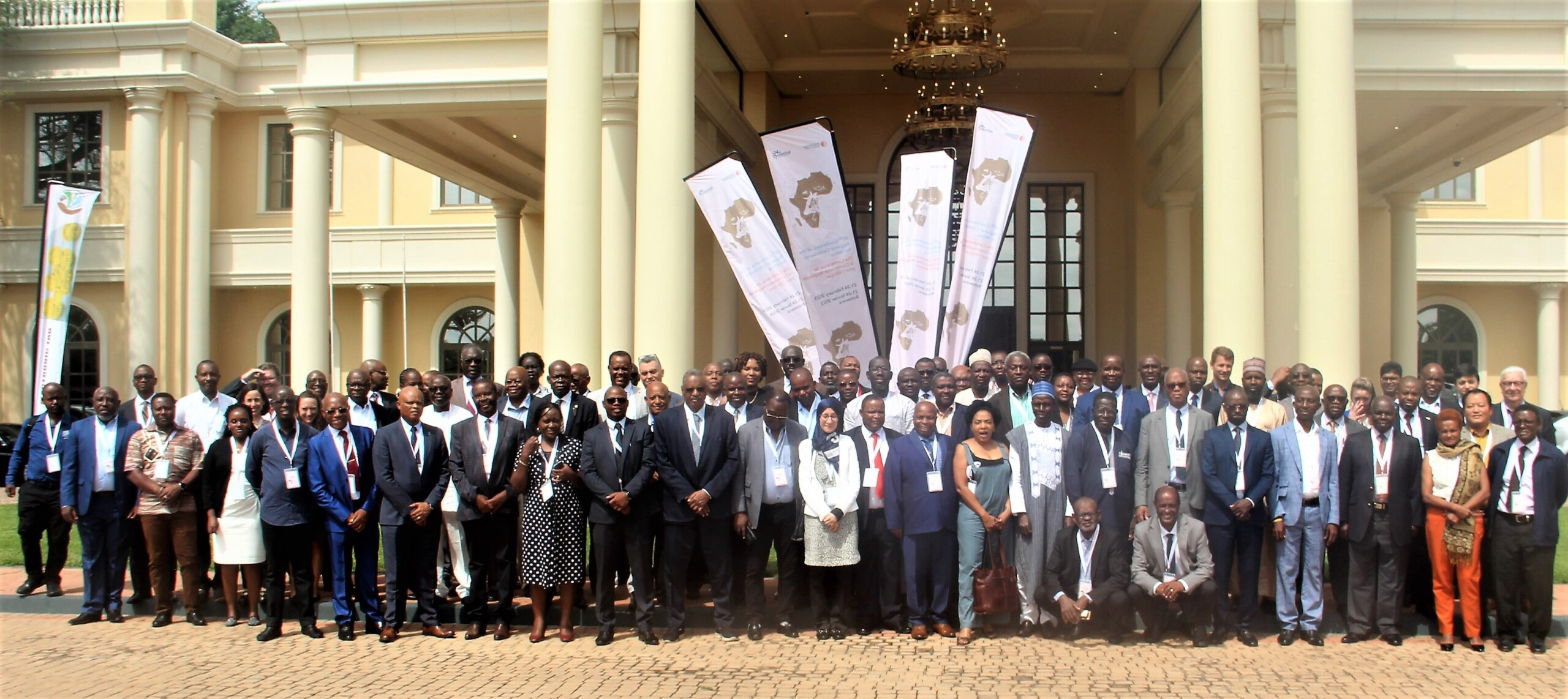
Dr Karim Tounkara, WOAH Regional Representative for Africa. Picture © P. Bastiaensen (woah) 2023. Africa Regional Seminar on Rabies : Is Africa ready for zero by thirty?
Dr Karim Tounkara, WOAH Regional Representative for Africa. Picture © P. Bastiaensen (woah) 2023
The Africa Regional Seminar on Rabies “Towards Elimination of Human Deaths from Dog-Mediated Rabies in Africa by 2030 : Is Africa ready for Zero by Thirty?” was organised in Gaborone, Botswana, on 20 February 2023, back-to-back with the 25th Conference of the Africa Regional Commission which was held from 21-24 February 2023.
The seminar was attended by more than 90 participants from 42 African countries and international partners. The seminar was held in the conference hall of the Gaborone International Convention Centre (GICC) in Gaborone, the capital of the Republic of Botswana. Dr. Karim Tounkara, WOAH Regional Representative for Africa (pictured), and Dr. Kefentse Motshegwa, WOAH Delegate for Botswana welcomed the participants to the seminar.
The overall seminar was chaired by Dr. Samuel Wakhusama, WOAH Sub-Regional Representative for Eastern Africa.
Dr. Moetapele Letshwenyo, WOAH Sub-Regional Representative for Southern Africa provided the outline of the seminar and its objectives which included
The first technical presentation was made by Dr. Rachel Tidman, WOAH Global Rabies Coordinator, and provided an overview of the types of support that the World Organisation for Animal Health can offer to the countries. She introduced the United Against Rabies Forum – the tools and resources available, and the way in which countries can engage in this network; the International Standards that provide guidance on disease notification, management of free-roaming dogs, case definitions, surveillance and diagnosis; the process for endorsement of official control programmes for dog-mediated rabies; the WOAH dog rabies vaccine bank, and the importance of surveillance and data collection, and how the WOAH rabies reference laboratories can support countries in improving this.
Dr Tenzin Tenzin, WOAH Rabies Project Coordinator, presented WOAH’s support towards the elimination of dog-mediated rabies in the African region. The WOAH Africa region supported Members in the delivery / donation of dog rabies vaccine to stimulate mass dog vaccination campaigns, development of rabies national strategic plans (NSP), rabies diagnostic capacity building at national laboratories through WOAH Rabies Laboratory Twinning Projects and networks, capacity building of Veterinary Services through training / workshops / webinars, and public advocacy on rabies by supporting World Rabies Day events.
Dr Claude Sabeta, Designated Expert of the WOAH Rabies Reference Laboratory at Onderstepoort, Pretoria (Republic of South Africa), spoke about the involvement of the WOAH Reference Laboratory’s support to veterinary laboratories in the Southern African Development Community (SADC) to ensure high-quality rabies diagnosis. The laboratory provided support through theoretical and bench training, coordination of regional proficiency tests, and back-stopping missions to specific veterinary laboratories. He also mentioned that the Reference Laboratory (through funding from WOAH) is currently supporting five Members (Eswatini, Lesotho, Malawi, Mozambique, Zimbabwe), together with the FLI (Germany) who are supporting four other Members (Angola, Botswana, Namibia, Zambia) to improve their diagnostic capacity for rabies testing and establish a Southern African Rabies Laboratory Network (RABLAB). In addition, Dr Sabeta mentioned that the laboratory support provided to the National Veterinary Research Institute (NVRI, Nigeria) and the Animal Health Institute (AHI, Ethiopia) via twinning projects both funded by the WOAH. As part of the objectives of the Prevention and Control of Transboundary Animal Diseases for the benefit of smallholder farmers (PC-TAD) project, the Reference Laboratory is also involved in a project in Eritrea (in eastern Africa) to increase their capability to diagnose rabies in animals and humans.
In her presentation, Dr Bernadette Abela from the World Health Organization (WHO) mentioned that Gavi, the Vaccine Alliance’s decision in 2018 to include human rabies post-exposure prophylaxis in its 2021–25 vaccine investment strategy was paused due to the Covid-19 pandemic. Studies conducted to support the decision of 2018 showed that a Gavi investment in the roll-out of rabies post-exposure prophylaxis would prevent an additional 489,000 deaths between 2020 and 2035, with the status quo resulting in an additional one million human lives lost due to rabies over the same period. Gavi’s investment will be a major contribution to saving lives; spur the end of neglect, inaction, and deaths from rabies; and contribute to the strengthening of health systems in three main ways:
Therefore, Members should voice their demand for the rabies rollout to Gavi and when the window for investment opens be ready to request to participate in the rollout.
The last presentation was made by Dr Elma Zanamwe from the UN Food and Agriculture Organization (FAO) and spoke about ‘FAO’s support in the implementation of Zero by 30 in Africa’ as well as FAO’s contribution to the rabies elimination programme by facilitating Members’ access to rabies information, improving surveillance and diagnostic capacity, by providing materials and training, and supporting awareness campaigns during World Rabies Day. She also mentioned that FAO is currently supporting several Members in Central and West Africa through various initiatives to develop a multi-sectoral action plan and to implement rabies elimination programmes. Dr Zanamwe also pointed out that 2030 is just around the corner, and therefore Members needed to accelerate their activities under the One Health approach.
Panel discussion on rabies advocacy. Picture © Tenzin Tenzin (woah) 2023. Africa Regional Seminar on Rabies : Is Africa ready for zero by thirty?
Panel discussion on rabies advocacy. Picture © Tenzin Tenzin (woah) 2023
A panel discussion was held on advocacy and effective mobilisation of national authorities on prioritising rabies control. The panelists were Dr Papa Seck, Senior Technical Advisor to the President of Senegal in charge of Animal Health, Livestock and Fisheries, Senegal, Dr Conrad Ntoh Nkuo, Permanent Secretary of the National Zoonoses Programme, Cameroon, and Professor Louis Nel, Executive Director, Global Alliance from Rabies Control, South Africa. It was moderated by Dr Karim Tounkara and Dr Rachel Tidman from WOAH.
Dr Karim Tounkara opened the discussion with a short statement welcoming participants and providing a very high-level summary of the need for prioritizing rabies in African region. He invited panellists to deliver a three to five minutes remarks addressing advocacy and effective mobilization of national authorities on prioritizing rabies control.
Dr Papa Seck and Dr Conrad Ntoh Nkuo, highlighted rabies burden in Africa and called for an action since it’s still a neglected disease when the necessary tools to prevent and control human deaths from dog-mediated rabies are available.
Dr Seck emphasised the imperative for a one health approach in the management of the disease also at national level, with the need for coordination between all public and private stakeholders, and the importance for national authorities to dedicate specific budgets for dog vaccination campaigns.
Dr Papa Seck, Senior Technical Advisor to the President of Senegal in charge of Animal Health, Livestock and Fisheries, Senegal. Africa Regional Seminar on Rabies : Is Africa ready for zero by thirty?
Dr Papa Seck, Senior Technical Advisor to the President of Senegal in charge of Animal Health, Livestock and Fisheries, Senegal.
On the other hand, Dr Ntoh Nkuo shared his experience on how to prioritise Rabies control activities and pointed out that the main issues are the limited communication and awareness, and the lack of adequate advocacy for resource mobilization to support rabies control and eradication. Both panellists shared countries specific rabies control activities including development of a national strategic plan for rabies, awareness, dog vaccination, surveillance as well as challenges to control rabies. They briefly shared the governance structure of the One Health approach coordinated at a very high level (Prime Minister’s Office) in their respective country as well as advocacy for rabies control.
Prof Louis Nel pointed out three main needs: to make a commitment, involving all stakeholders and building strong relationships between partners; to implement communication, to build trust; to invest in education and awareness, through training activities. Then, he also stressed the importance of capacity building, transparency and accountability to engage all stakeholders in rabies control endeavours. He emphasized the crucial role of monitoring and evaluating for an appropriate assessment of progress and challenges and the consequent adjustment of strategies and plans.
Dr Karim Tounkara and Dr Rachel Tidman asked panellists clarifications on their experience on national action plans, the ideal advocacy programme, the main challenges in advocacy, and how to overcome them, and how to effectively build an advocacy programme.
According to Prof Nel, advocacy is crucial in addressing rabies control challenges since rabies affects both humans and animals, and the disease is preventable but suffers from a lack of awareness and resources. Furthermore, he emphasised how rabies control would help strengthen the capacities of national health systems in the preparation, prevention, detection, and response to other zoonoses.
Dr Seck mentioned the importance of including rabies as a priority disease for One Health and how to develop integrated national strategic plans for disease control through OH platforms at local, national, regional, and global levels. Dr Ntoh Nkuo identified a lack of reliable data, inappropriate communication, and lack of education on One Health as being major challenges for advocacy. It would therefore be important, especially in the case of limited resources, to have integrated data-sharing systems, where human and animal health data can be shared transparently to make a decision. According to the three panellists, Members can be supported to build advocacy programs by helping them: to build a case; to mobilize resources by generating reliable data, conducting SWOT analysis and progress reports and submit to donors; to implement the communication by raising awareness and educating all stakeholders using available tools and United Against Rabies Forum.
In conclusion, the panellists expressed optimism towards “zero human death by 2030” and called on WOAH Delegates, participants and Members to engage as key players and to take advantage of the existing resources and support to progress towards the goal.
World Café Session. Picture © Tenzin Tenzin (woah) 2023. Africa Regional Seminar on Rabies : Is Africa ready for zero by thirty?
A World Café Session was organised in the afternoon of the 20th Febuary 2023. The participants were divided into four groups and discussed four key topics: 1) One Health National Strategic Plans for Rabies Elimination and country commitment, 2) dog population management, 3) rabies surveillance and diagnostic capacity, and 4) dog vaccination. Around six sub-questions were asked for each topic focusing on their current status, what were the challenges, what are their interests in, and what supports are required to implement the activity. Sticky note pads were used to gather the data.
World Café Session. Picture © Tenzin Tenzin (woah) 2023






